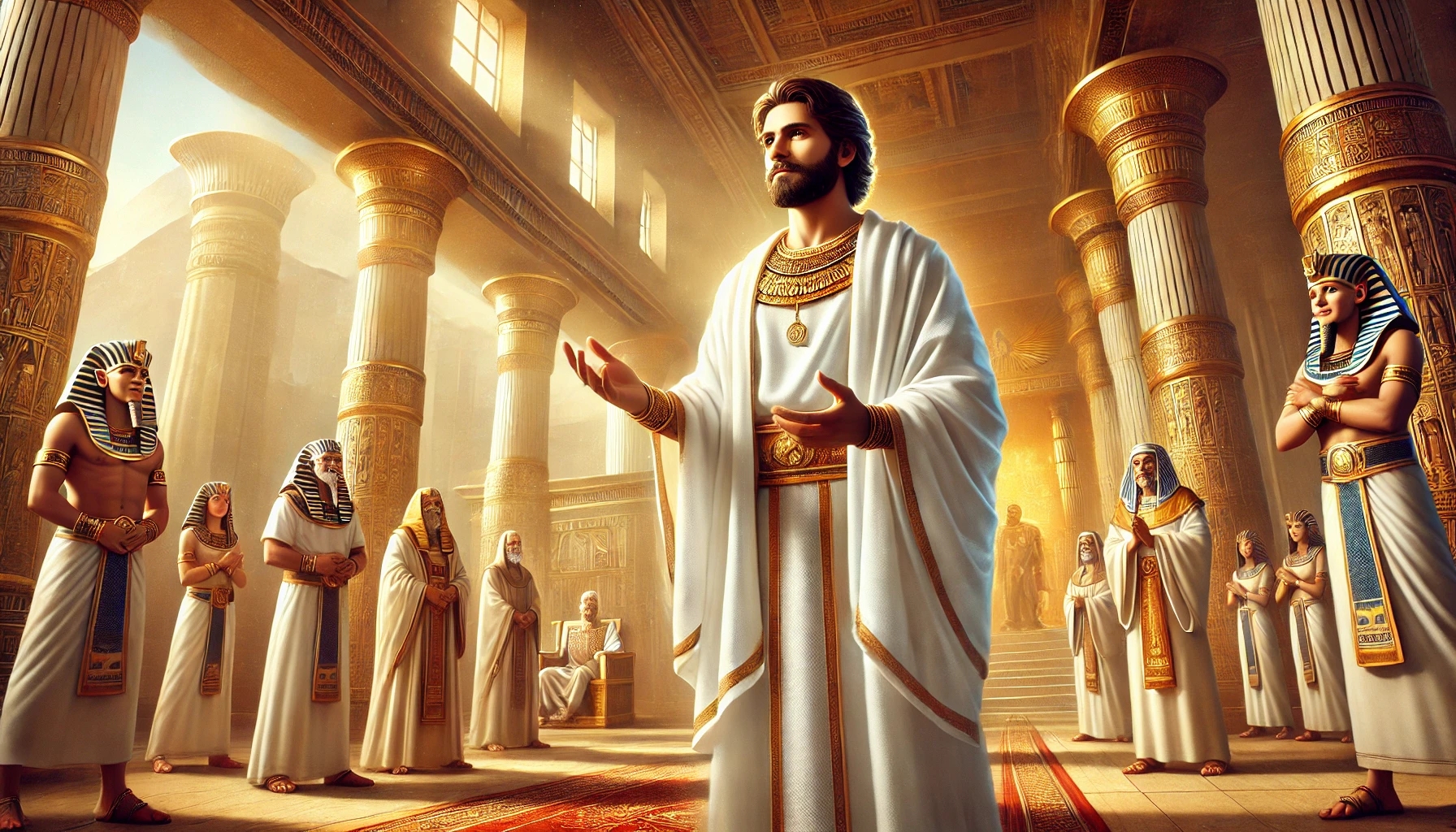 August 3, 2025
August 3, 2025
 Joseph – Faith That Endures
Joseph – Faith That Endures
Devotions from the life of a dreamer with character
 9.Jesus is Greater Than Potiphar
9.Jesus is Greater Than Potiphar
When people hurt you – but God still lifts you up
 Introduction
Introduction
Sometimes doing the right thing seems to lead to disaster. Joseph chose integrity – and ended up in prison. He fled from temptation, but was treated as guilty. How can that be fair?
But his story shows: God’s standard is not the world’s standard. Even when people judge you wrongly, God sees the heart. Even when you lose what is rightfully yours – Jesus is greater than any earthly authority. And He stays on your side.
──────────────── ────────────────
────────────────
 Devotional
Devotional
Genesis 39:20–21
“So Joseph’s master took him and put him in prison… But the LORD was with Joseph.”
Potiphar believed a lie. Joseph was condemned without the chance to defend himself. Injustice at the highest level. Yet in the middle of this dark situation, we read a sentence of hope: “But the LORD was with Joseph.”
Joseph could have become bitter. He could have resigned or broken inside. But he didn’t. Instead of looking at people, he fixed his gaze on God. His faith didn’t rely on praise or fairness – it was grounded in God’s character.
Jesus knows this experience. He too was falsely accused, mocked, condemned. He too was abandoned by the powerful – but lifted up by the Father. Joseph is a role model – but even more, a signpost to Christ. And Christ is our comforter in exactly such moments.
──────────────── ────────────────
────────────────
 What We Can Learn from Joseph
What We Can Learn from Joseph
1.Joseph was outwardly imprisoned, but inwardly upheld.
➤ Freedom does not begin with external circumstances but with inner conviction. Though in prison, his soul remained upright. His faith carried him through the darkness.
2.“But the LORD was with Joseph.”
➤ This is not a pious cliché, but a deep promise. God’s presence is not bound to places. He is present – in palaces and in prison cells. Joseph was not alone, and neither are you.
3.Jesus is greater than Potiphar.
➤ Potiphar symbolizes people with limited power – often fickle or unjust. But Jesus’ authority goes deeper. His justice has the final word – full of truth and grace.
4.Joseph did the right thing – and was still punished.
➤ Faithfulness doesn’t guarantee immediate recognition. But God sees what is hidden. He rewards not by human schedule, but by eternal standards.
5.God works in the unseen.
➤ Just because we see nothing doesn’t mean God is doing nothing. As with Joseph, He quietly and faithfully prepares the next step – patiently, powerfully, effectively.
6.Jesus understands such situations.
➤ Our Redeemer is no stranger to suffering. He knows rejection, loneliness, false accusations. That’s why He meets us not from a distance, but with real, compassionate closeness.
7.The place of humiliation became the place of preparation.
➤ God turns prisons into classrooms. In the depths, He shaped Joseph’s character for future heights. Setbacks are often God’s workshop – where strength, humility, and trust grow.
──────────────── ────────────────
────────────────
 Reflection – What Does This Mean for You?
Reflection – What Does This Mean for You?
When were you last judged unfairly – and how did you respond?
What area of your life feels “unjust”?
What decision is currently costing you something – and are you willing to stick with it in integrity?
In what situation is God calling you to focus on Him instead of people?
──────────────── ────────────────
────────────────
 Story – “The Student Without a Voice”
Story – “The Student Without a Voice”
A story about blame, courage – and the One who sees you.
Chapter 1 – The Accusation
Simon was 16 and rather quiet. Not a leader, but kind. One day, the school had a fire alarm – someone had deliberately triggered a sensor. Three witnesses named his name.
He was called to the principal’s office. No one believed his version. The school administration said they were “forced to take action.” One week of dorm suspension. No phone. No visits.
Simon felt powerless. He was innocent – but his voice didn’t count.
✦ ─────────────── ✦ ─────────────── ✦
Chapter 2 – The Psalm in the Notebook
On the second evening, he found an old notebook in his backpack. Inside was a note from his grandmother:
“Never forget: The Lord fights for you. Psalm 37:5.”
He opened the Bible and read:
“Commit your way to the LORD; trust in him and he will act.”
For the first time that week, he prayed. Not aloud. Just in his heart:
“If you’re there, God… show me. I don’t have a voice anymore.”
✦ ─────────────── ✦ ─────────────── ✦
Chapter 3 – The Unexpected Visitor
The next day, a new teacher showed up at the dorm – a temporary substitute for religion class. She requested one-on-one conversations with each student “to get to know them better.”
When she spoke with Simon, she gently asked:
“What’s on your mind?”
He said: “I feel like no one’s listening to me.”
She answered: “Sometimes the silence of people becomes the stage for God’s voice.”
Then he told her everything. She listened – and promised nothing. Only: to pray.
✦ ─────────────── ✦ ─────────────── ✦
Chapter 4 – The Resolution
Two days later, a student anonymously confessed to being the one responsible. The principal apologized to Simon. But Simon simply said:
“I’m thankful – not that it’s over, but that I felt God. I learned: Even when people don’t hear me, God hears.”
──────────────── ────────────────
────────────────
 Reflections on the Story
Reflections on the Story
God is near, even when our voice is ignored.
Injustice wounds – but it can lead us to a deeper experience of God.
People change their opinions – God’s view of you stays the same.
The place of shame can become a place of strength.
──────────────── ────────────────
────────────────
 Application
Application
-
Choose integrity even when it costs you something.
-
Pray honestly, even when you’re hurt.
-
Read the Bible as a mirror – especially Psalms in difficult times.
-
Seek people who will listen – and be someone who listens.
-
Give God space to act – even when you don’t (yet) understand.
──────────────── ────────────────
────────────────
 Prayer
Prayer
Lord,
you see my heart – even when others don’t.
You know the truth – even when no one believes me.
You are just – even when the world isn’t.
Give me strength to trust you today.
Help me not to become bitter – but to remain faithful.
Make me able to live forgiveness, and not lose hope.
Amen.
──────────────── ────────────────
────────────────
 Key Thought of the Day
Key Thought of the Day
God’s view is more important than people’s judgment.
Jesus is greater than any earthly power – and He stays by your side.
──────────────── ────────────────
────────────────
 Blessing to Close
Blessing to Close
May the Lord be your advocate when you have no voice.
May He strengthen your spine when others try to bend you.
May He be your light in the shadow of injustice –
and lead you step by step into His truth.
──────────────── ────────────────
────────────────
LumenCorde | Daily light for a living soul.

 Adventist News Network – August 01, 2025: Children escape the war & More Global News |
Adventist News Network – August 01, 2025: Children escape the war & More Global News |
 THE SECOND BOOK OF MOSES
THE SECOND BOOK OF MOSES Lesson 5: Passover
Lesson 5: Passover 5.7 Questions
5.7 Questions How God’s Justice and Love Work Hand in Hand
How God’s Justice and Love Work Hand in Hand Introduction
Introduction Answers to the Questions
Answers to the Questions Question 1: How do we reconcile God’s justice in killing the firstborn—many of whom were surely “innocent”—with His love?
Question 1: How do we reconcile God’s justice in killing the firstborn—many of whom were surely “innocent”—with His love? Application for Daily Life
Application for Daily Life Conclusion
Conclusion Thought of the Day
Thought of the Day Illustration – The Red Scarf
Illustration – The Red Scarf 02 August 2025
02 August 2025 BELIEVE HIS PROPHETS
BELIEVE HIS PROPHETS Daily Bible Reading
Daily Bible Reading Leviticus 18 – Living Holy in an Unholy World
Leviticus 18 – Living Holy in an Unholy World God’s standards for purity, relationships, and identity
God’s standards for purity, relationships, and identity Bible Text – Leviticus 18 (KJV)
Bible Text – Leviticus 18 (KJV) Introduction
Introduction Commentary
Commentary 1. Holiness begins with distinction (verses 1–5)
1. Holiness begins with distinction (verses 1–5) Summary
Summary Message for Us Today
Message for Us Today Reflection Questions
Reflection Questions
 Ellen White | Patriarchs and Prophets – Chapter 20
Ellen White | Patriarchs and Prophets – Chapter 20
 Joseph in Egypt
Joseph in Egypt Read online
Read online  1. Brokenness: Loneliness and Loss (The Beginning of the Journey)
1. Brokenness: Loneliness and Loss (The Beginning of the Journey) Reflection Question
Reflection Question